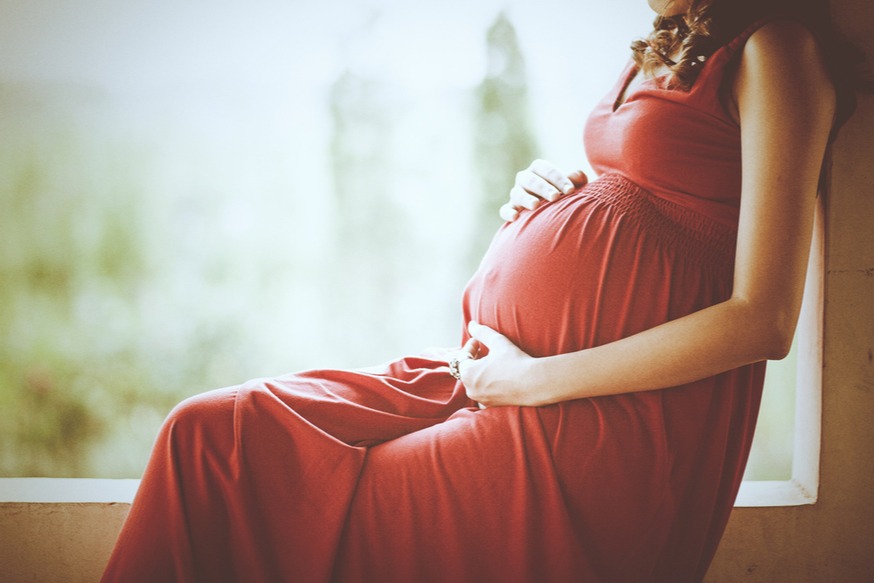
Getting pregnant: everything you need to know about your fertile days!

Getting pregnant; it sounds simple enough, right? You would think that it’s not that difficult, but in reality it can be quite a challenge. Some women get pregnant on the first try, while others have to deal with disappointment month after month. There are several tried-and-true methods of increasing your chance of getting pregnant. The bottom line? Know when you’re at your most fertile. Timing is key.
How long does it take to get pregnant?
When you start trying to get pregnant, you often expect the most rose-coloured scenario; one, two, maybe three months, and then that pregnancy test will tell you the good news. But the chance of getting pregnant within a couple of months is not as high as you might think. Out of every woman trying to get pregnant, 30% will test positive within three months, 70% gets pregnant after six months and 80% after a year. After two years, more than 90% will have become pregnant.
The role of age
Those percentages have everything to do with age. If you’re under 30, you have about 20% chance of getting pregnant every month. If you’re older than 30, this percentage slowly decreases. The number of egg cells in your body decreases and the quality of your remaining egg cells is not as high as it used to be. That is why miscarriages are more common among women who get pregnant at an older age. Of course there are plenty of women over 35 or even 40 who are giving birth. But the chances of medical complications and difficult pregnancies do increase.
If you’re older than 35 and you haven’t conceived after a year of trying, contact your GP for advice. If you’re older than 40 and you want to get pregnant, it’s a good idea to contact your GP beforehand.
How often do you have to have sex to get pregnant?
There are only a couple of days during a woman’s cycle that she can get pregnant. So you don’t have to have sex every day of the month to increase your chances. If you know yourself and your body well, you probably already know when you’re at your most fertile. Your skin and your eyes get a beautiful glow, you feel good, and sometimes you’re even bursting with energy. This makes sense from a biological standpoint. The more attractive you look during these days, the more chance you have of attracting a man for reproduction. Many women notice an increase in libido during these days as well.
Average cycle
What happens exactly during that fertile period? About eight days after your menstruation, the lining of your uterine wall thickens. That’s when your fertile period begins. Usually, an egg cell is released from your ovaries around the fourteenth day of your cycle, which means that you’re already fertile for five to six days before ovulation. This is because sperm cells are able to survive up to five days in your body. An egg cell has a life span of one day after it’s released, so after ovulation, you have about twenty-four hours to get pregnant.
Stubborn egg cells
You’re probably thinking: alright, easy enough. Unfortunately our bodies aren’t always that predictable. Most women aren’t blessed with a perfect 28-day cycle with an egg cell being released exactly on the fourteenth day. Nearly half of all mentrual cycles are more than seven days longer or shorter than the average 28 days. That makes it very difficult to pinpoint your fertile period. If you’ve been unsuccessfully trying to get pregnant for a while, it’s possible that you’re having sex on the wrong days.
How do I calculate my fertile days?
Your mission is clear: have sex on the day that you ovulate and the days before that. Now all you have to do is find out when exactly that egg decides to come out looking for sperm cells. There are various ways to do it, some more scientifically proven than others. We created an overview for you!
- Ovulation tests: when you get closer to the day of your ovulation, your body will increase the production of oestrogen. This hormone makes sure that your uterine wall grows thicker and that it doesn’t repel sperm cells. This increase in oestrogen alerts another hormone, luteinising hormone (LH), to become active as well. An egg cell can’t be released from the ovaries without this LH hormone. After 24 to 36 hours before your ovulation, the LH hormone reaches its peak level. An ovulation test is able to detect that peak and can therefore reliably tell you when you ovulate. Try to have sex on that day. Sex on command is probably not that romantic, but it’s often very effective.
- Calendar method: not as reliable, but a calendar can help you predict your fertile period as well. How does it work? Carefully keep track of your menstrual cyle for six to twelve months. Your cycle starts on the first day of your menstruation and ends the day before your next menstruation. If your cycle is very regular, your ovulation falls somewhere between the twelve and sixteen days before your next mentruation. So it’s important to have sex regularly in the second week of your cycle until you’re sure that your ovulation has passed. If you have sex every other day, there is a fresh batch of sperm cells in your body throughout that period. But of course you can also have sex every day to increase your chances. The calendar method works best if you have a regular cycle. Apart from that, the key ingredient is patience. So if you’re in a hurry, an ovulation test is probably your best chance.
Ovulation signals
When you start ovulating, your body signals this to you and your surroundings by creating ‘symptoms’. We already mentioned the confidence boost and the increase in libido that goes along with ovulation. But cervical mucus and ovulation pain can also be clear indicators that you’re going through your fertile days.
- Cervical mucus: it probably sounds a little unsavoury, but it’s worth your while to check your discharge. During your cycle, your cervical mucus continuously changes, with a particularly noticeable change in the days before ovulation. The mucus becomes clear and elastic, sort of similar to egg white. If you want, you can even create a strong thread between your thumb and index finger. The reason for these tough mucus threads? It helps guide sperm cells inside the vagina.
- Ovulation pain: about one fifth of all women experiences pain during ovulation. She can feel the egg being released and this pain can last for a couple of hours to a couple of days. It feels like menstruation pain, but only on one side of the pelvis: the side where the egg is released. If you have a very regular cycle, it can help to pay attention to ovulation pain. There’s a good chance that you’re ovulation is taking place at that moment, which is the perfect time to have sex. However, because this pain is also often present after ovulation, it’s not a very reliable method to determine your fertile days.
How do you know if you’re pregnant?
Did your efforts in the bedroom pay off or not? We’re impatient creatures, so most women tend to scan their bodies for early symptoms of pregnancy. Every body works differently, so it depends on your body whether or not a you can find early signs of pregnancy. Some women immediately know that they’re pregnant, while others only notice a couple of days after not menstruating.
Hormones
Being late is the clearest sign that there is something going on. But symptoms like sudden fatigue, breast pain, morning sickness, and mood swings also occur early in your pregnancy. So if you’re irritable, overly emotional, or irrationally angry, it might not be your PMS this time, but rather your pregnancy hormones taking you for a spin.
Hello, Tena Lady!
You might start to develop a dislike for certain foods during your pregnancy while also experiencing overwhelming cravings for other foods, like gherkins. A little later during your pregnancy, around the sixth to eighth week, you’ll notice that you have to pee more often. This is because your uterus starts to grow to make room for your baby, which puts pressure on your bladder. So say hello to Tena Lady (no, seriously!). Fortunately, this gets better towards the end of the first trimester, as your uterus will have moved a little upwards by then.
The bad news: your uterus will put pressure on your bladder again in the third trimester. Nobody said it was easy!
Sex should be fun!
Of course we understand that you want to feel a baby grow inside your belly as soon as possibe. But don’t forget that the time you spend trying to get pregnant should be fun. If you focus too much on getting pregnant, sex eventually becomes a chore instead of a fun, intimate moment with your partner. Disappointment and different expectations can eventually start to put a strain on your relationship. That kind of stress is never helpful and definitely won’t increase your chances of a successful conception.
So make sure you stay relaxed and that you and your partner maintain a healthy lifestyle. It’s also important that sex doesn’t turn into an obligation. You will be amazed if you knew how many couples, after months and months or trying, suddenly get pregnant after having unplanned and relaxed sex.







Respond or ask a question
0 comments